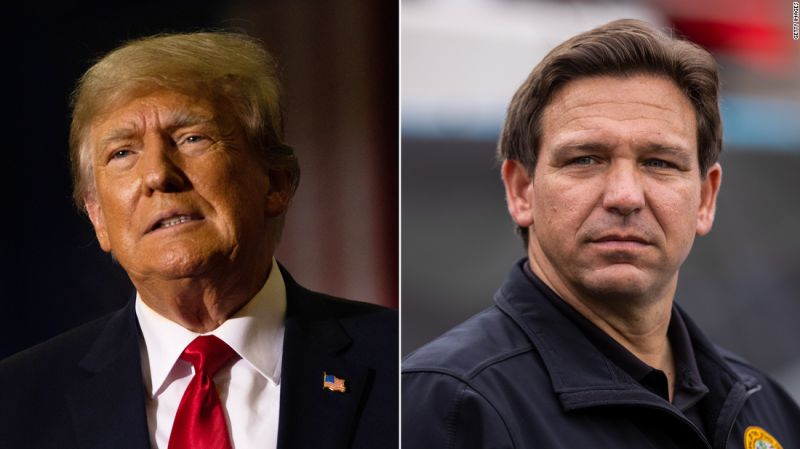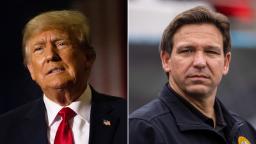

CNN
—
In a preview of a potential Republican presidential primary showdown, Donald Trump and Ron DeSantis will hold dueling Florida rallies on Sunday as the two men battle for supremacy of the Sunshine State and the heart of the GOP.
The former president will welcome supporters in Miami, the third stop in a four-city tour that has effectively made Trump a leading player in his party’s fight for control of Congress. Meanwhile, the Florida governor will headline his own events in three counties on the state’s opposite coast – Hillsborough, Sarasota and Lee – steering far clear of Trump as he seeks to close out his bid for a second term.
For the past two years, Trump and DeSantis have coexisted on opposite ends of Florida – Trump plotting his next move from his Mar-a-Lago estate in Palm Beach and DeSantis building himself into a household name from the state capital in Tallahassee. But as these midterms come to a close and with a decision looming about their political futures, even on a peninsula 450 miles long, it has become increasingly difficult for the two to avoid each other.
“We have two very stubborn, very type-A politicians in Florida that are at the tip of the spear for the GOP,” said one Republican official who asked not to be named. “They both command attention but they both have their own political operations and that’s what you’re seeing. It’s already exhausting to talk about.”
The long simmering rivalry has spilled into public view during the final weeks leading into Election Day. DeSantis recently endorsed Republican businessman and Colorado Senate candidate Joe O’Dea, as O’Dea vowed in October to “actively campaign” against Trump.
“A BIG MISTAKE!” Trump wrote in response on his Truth Social platform.
Trump followed up by sharing a clip of former Fox News host Megyn Kelly predicting GOP voters would remain firmly in Trump’s camp if DeSantis decided to challenge the former president in a Republican presidential primary. CNN reported Friday that Trump could launch his next presidential bid as soon as this month.
But planning competing events inside Florida two days before a momentous Election Day is especially illustrative of how fraught the relationship between the former allies has become. Unlike other potential 2024 contenders, DeSantis has not declined to run against Trump in a primary, much to Trump’s ire. DeSantis, meanwhile, believes such a concession would undermine his attempts to keep the focus on his current reelection race instead of what may lie ahead, CNN previously reported. DeSantis and his campaign have declined to publicly discuss his plans for after the midterm, but in a recent debate, he wouldn’t respond when asked if he intends to serve a four-year term if reelected.
If they do go head-to-head in a primary, the two candidates may find themselves on similar financial footing. DeSantis has raised $200 million this campaign cycle through his two political committees and has spent just over half, leaving about $90 million in potential seed money for a Super PAC. At the end of October, Trump was sitting on about $117 million between his three active fundraising vehicles, according to federal election data.
Trump’s pre-election travel is motivated at least in part by his desire to launch a third campaign for the White House, CNN reported this week. Indeed, during a visit to Iowa on Thursday, Trump told voters in the first-in-the-nation caucus state to “get ready” for his return as a presidential candidate. Trump stopped in Pennsylvania on Saturday – home to the tight Senate race between his endorsee, Republican Mehmet Oz, and Democrat John Fetterman – and he’ll spend election eve in Ohio, where the former president endorsed Republican J.D. Vance in the Senate race against Democrat Tim Ryan.
But planning a Florida rally was also widely seen as a shot across the bow at DeSantis. Trump first announced last week his intent to hold a rally for US Sen. Marco Rubio in South Florida, leaving DeSantis noticeably out of his plans. Since then, the roster of guest speakers has grown to include the state’s junior senator, Rick Scott, as well as a dozen other elected officials and candidates from around the state.
The decision to hold the rally in Miami-Dade County comes as Republicans are optimistic they will carry the one-time Democratic stronghold for the first time in two decades. Investments by Republicans to make inroads in the area’s Hispanic neighborhoods have paid off in recent elections, and the party is seeing a wave of enthusiasm that is turning the state a deeper shade of red. Republicans will hold an advantage in voter registration on Election Day for the first time in Florida’s modern political history.
Ahead of his arrival, Trump was already taking credit for that turnaround.
“President Trump delivered a historic red wave in Florida in the 2018 midterms with his slate of endorsed candidates up and down the ballot and molded the Sunshine State into the MAGA stronghold it is today,” the announcement from Trump’s Save America PAC said. “Thanks to President Trump, Florida is no longer a purple state; it’s an America First Red State.”
While DeSantis embarked on his own out-of-state campaign circuit for Republican candidates, including a recent rally in New York for GOP gubernatorial nominee Lee Zeldin, he is spending the final days of the race against Democrat Charlie Crist barnstorming across Florida. His campaign had 13 scheduled events between Friday and Monday. On the final day, DeSantis has a stop planned in Trump’s adopted home county of Palm Beach and in Miami-Dade not far from Trump’s Sunday event.
On the campaign trail, DeSantis doesn’t talk about Trump, but his remarks are peppered with frequent mentions of President Joe Biden in a preview of what a presidential campaign against the incumbent Democrat might look like.
At an event Thursday in Central Florida, DeSantis called Biden “King Midas in reverse.”
“Biden touches it and turns into something much worse than (gold),” DeSantis said. “It’s frustrating and a lot of people, the vast majority of Americans, they think that the country has seen its best days. They think that we’re clearly on the wrong track. But you know, I think Florida provides the blueprint that other states can follow.”
